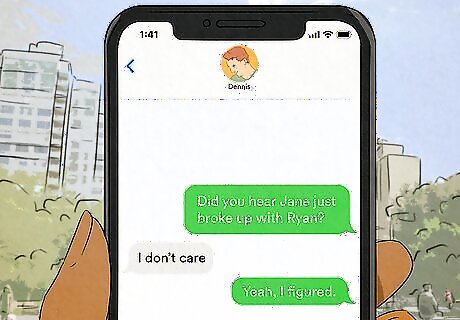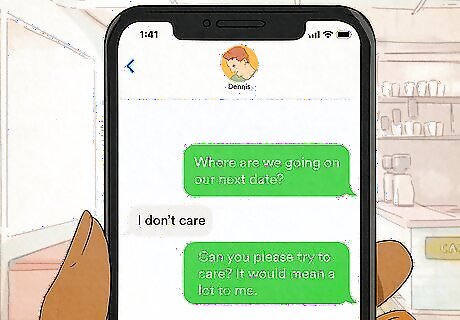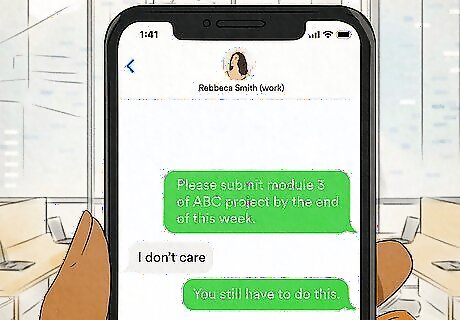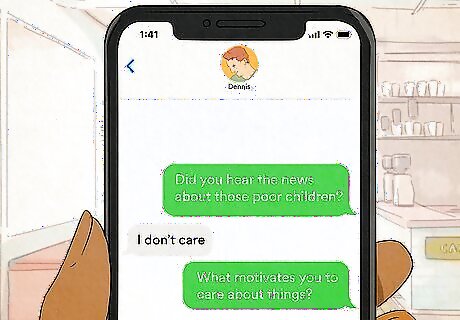
views
“Okay!”

Accept someone’s lack of caring and make a decision yourself. This works in low-stakes scenarios, like when a friend says they don’t care about which movie to watch or what time to grab dinner. In these cases, someone usually says “I don’t care” in a positive way to suggest they’re open to whatever you have in mind. “Ok cool, let’s plan for 8pm then.” “Sounds good, I’ll let you know what I decide later.” “OK. I prefer rosé over cabernet, so I’ll get that.”
“Yeah you do.”

Playfully call someone out on their bluff if you know they have an opinion. This works great on friends, family members, or significant others you want to tease a little bit. Use it in low-pressure scenarios to get them to tell you what they really want or think. “Oh come on, yes you do.” “I think you do!” “Spare me the act, you totally care!”
“I can tell!”

Joke that someone’s appearance or actions match their bad attitude. This is another lighthearted response that’s great for people you know can take a little joke, like friends or relatives. It’s especially effective when someone doesn't care about something related to their looks or achievements. “I can see that.” “Really? I couldn’t tell!” “Yep, it looks like it.”
“I know.”

Acknowledge you’re aware of someone’s lack of caring. Use this cajoling response to show you weren’t expecting them to care deeply, but you still need their input or action on something. It’s like saying “too bad!” in a friendlier way and works best on people you have a good working or personal relationship with. “Yeah, I figured.” “That’s a shocker.” “Surprise, surprise!”
“Why not?”

Be straightforward and just ask someone you’re close with why they don’t care. If you already suspect the reason—something like peer pressure, insecurity about the subject, or anger—feel free to throw it out there and see how they respond. It helps to know someone’s motivation (or lack thereof) for putting on an aloof facade. “Why don’t you care? Is it because you’re mad at me?” “Is that because none of your friends think it’s cool to care?” “Why’s that? You can tell me if you do care, you know.” Daniel Goleman Daniel Goleman, Psychologist When faced with "I don't care," pause before reacting. There are often deeper emotions behind those three dismissive words — anger, hurt, indifference or more. Rather than responding defensively, name the real feeling to defuse tensions. Ask clarifying questions. Allow them to explain more. With self-awareness and open communication, "I don't care" becomes an opportunity to thoughtfully navigate differences, not escalate them. Look beyond the statement to find the true emotion.
“I care.”

Be straightforward and let someone know you do care. This works best when you’re talking to someone you’re close to and who values your goals and needs, like a friend, family member, or significant other. Hopefully, they’ll change their tune and respond differently when they see how important something is to you. “This is important to me.” “I really do care about this and I wish you did too.” “This matters to me!” Focus on explaining the way you feel rather than focusing on their behavior. This is a good way to tread lightly in a conversation without offending the other person.
“You should care.”

If it’s in someone’s best interest to care about something, tell them. Be honest and explain how your friend, child, or student will benefit from being more invested or describe the down side of staying aloof. This works great when you want to persuade someone to put more effort into school, work, their health, or something vital to their success. “If you care about getting into college, you should care about this.” “Your health should be important to you. You’ll feel better!” “You need to care about obeying the law or you could end up in jail.”
“Please try to care.”

Encourage someone to look for positives in the thing they don’t care about. Explain how the entire process or task will be more fun, interesting, or easier if they’re somehow invested. This is extra helpful when you want to convince a coworker or significant other to put effort into something you value as a favor. “Can you please try to care? It would mean a lot to me.” “If we do this, then you get to leave work early. Don’t you care about that?” “Maybe you don’t care about car maintenance, but you care about your annual road trip, right?”
“You’ll care when you see the results!”

Point out that the future can be a big motivator in the present. If a student or child doesn’t care about something now—homework, starting a project early, saving money—giving them an idea of what the future could be like if they cared more now. Use this one jokingly for trivial things or more seriously if someone’s going through a real problem. “You’ll wish you cared more about sunscreen this morning when you see all the burns you’re getting!” “You’ll care about spending time with me once I move away for good!” “You might not care about saving up now, but you’ll be glad you did later!”
“Things would be better if you cared.”

Tell someone that caring leads to improvements for everyone. Nothing gets done if nobody cares, so someone has to! Pointing out the positive end results of investing in something will hopefully turn a colleague or student’s attitude around and motivate them to shift their attention to something that matters. “If you’re not gonna care about it, who will?” “If everyone cared as little as you, nothing would ever get better.” “You could turn this entire business around if you cared a little.”
“This isn’t about caring.”

Explain they’ve got to do something whether they care or not. Whether it’s a looming task or an important conversation, some things just have to be done. Use this to help an employee, student, or child see the larger picture—how they can help a situation or other people by doing something that they don’t care about personally. “What’s your point?” “That’s irrelevant.” “You still have to do this.”
“I don’t care if you don’t care.”

Emphasize that someone needs to listen whether they care or not. When something’s urgent or important to you, let the other person know they need to hear you out. Use this when you need to get your point across to someone who’s actively trying to blow you off—it’s a little blunt, but it’s loud and clear. “I’m sorry you’re not interested, but this is important.” “Too bad! We need to get this figured out.” “That’s unfortunate, but we still need to hash this out now.”
“We all have to do things we don’t care about sometimes.”

Tell a student or child it’s part of life to do things they don’t care about sometimes. No single person can care about everything, so we all eventually face an obligation or task we’re not 100% invested in. Sometimes, you just have to grin and bear it. “It’s just a part of life!” “It’s OK not to care about something you have to do, but you still have to do it.” “It’s the right thing to do, even if you don’t care.”
“Why are you here, then?”

Have someone explain why they’re in a situation they “don’t care” about. If they have an answer, then it shows they really do care about some aspect of what they’re doing or who they’re with. Putting a teammate or coworker on the spot like this highlights their hypocrisy (and makes them less likely to say “I don’t care” around you again). “Why did you sign up for tryouts if you don’t care about the results?” “How come you do everything Julie asks if you don’t care if she likes you or not?” “If you don’t care about your grades, why were you up studying all night?”
“What do you care about?”

Find out what motivates someone to get to know them. They might just be insecure about revealing what matters to them. Ask what they care about genuinely to show they can be more open and honest with you. Chances are they’ll become more receptive to what you care about, too. “Well, what do you care about instead?” “What’s something you’re passionate about?” “What motivates you to care about things?”
“What if your hero didn’t care?”

Make someone consider, “what if a celeb or historical figure didn’t care?” This half-joke, half-philosophical question will get students and young people thinking about the impacts of their actions and attitude. Maybe if they care, they can be the next influencer, celebrity, or grassroots leader to make a difference. “What would happen to the climate if Greta Thunberg didn’t care?” “Where do you think the Bulls would’ve been in the 90s if Michael Jordan didn’t care?” “What if Santa Claus didn’t care? There’d be a lot of kids out there without toys!”
“How will you accomplish anything if you don’t care?”

Ask how they’ll achieve their goals with an apathetic attitude. Caring leads to motivation, which leads to action and results. Ask friends, students, or young people this question to encourage someone to rethink their attitude about something, or to seek out something they truly care about accomplishing. “Do you think colleges are looking for students who don’t care?” “How’re you going to raise all that money if you don’t care about the cause?” “How will you change your exercise habits if you don’t care about getting in shape?”
“That’s weird since you bring it up constantly.”

Point out the hypocrisy when someone insists they “don’t care” all the time. Chances are they really do care (at least a little bit) if they want you to know they don’t care so badly. Use this comeback in serious conversations or just to poke lighthearted fun at someone like a friend or relative. “It seems like you might care since that’s the third time you’ve mentioned that today.” “It’s strange you don’t care since you bring it up all the time!” “Why are you telling me you don’t care if you don’t care?”
“You’re not cool enough to care!”

Tease someone when it doesn’t matter if they care about or not. This works great in lighthearted situations where the outcome is trivial, like which toppings to get on a pizza. Save this comeback for people who know your sense of humor and won’t be offended by a friendly joke, like friends and relatives. “You’d know this is a matter of life and death if you were as cool as me.” “Only lame-o’s don’t care!” “Find yourself some swag, maybe then you’ll get it!”
“I cared about your stuff!”

Playfully remind someone you’ve cared about their problems and interests. It’s a good way to motivate them to get more invested in your hobbies and feelings, as well as a lighthearted chance to tease friends or family about embarrassing or minor things they made a big deal of in the past. “Did I say ‘I don’t care’ when you ripped your pants at the mall? No!” “Hey, I gave plenty of hoots when you needed help asking Michael out.” “I cared when you needed help, didn’t I?”
“Sorry it’s not about something fun.”

Point out their investment in trivial things over important matters. Highlight their strange priorities next time they say “I don’t care” about a pressing topic. Hopefully they’ll realize they need to shift their attention to something else for a while to help you (or themselves) out. “Well I’m sorry your tax returns aren’t as interesting as the Oscars!” “I know it’s not about the Cubs, but this is important.” “So you care about The Bachelor but not your actual boyfriend?”












Comments
0 comment